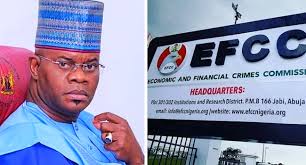The former Governor of Kogi State, Alhaji Yahaya Bello, has expressed his willingness to appear before the Federal High Court in Abuja to address the 19-count charge filed against him by the Economic and Financial Crimes Commission (EFCC).
Bello who was not present for his arraignment, had he briefed a team of lawyers who represented him in court on Tuesday. His legal counsel, Mr. Adeola Adedipe, SAN, informed the court that Bello desired to attend the proceedings but was apprehensive about potential arrest.
“The defendant wants to come to court but he is afraid that there is an order of arrest hanging over his head,” Adedipe, SAN, stated.
READ ALSO: EFCC Declares Yahaya Bello Wanted Over Alleged N80bn Fraud
Consequently, Bello’s legal team urged the court to set aside the ex parte order of arrest issued against him, arguing that the charge had not been properly served as required by law at the time the warrant was issued.
Meanwhile, Bello maintained that the EFCC is an illegal organization, contending that the enactment of the EFCC Act did not follow constitutional procedures.
However, EFCC’s lawyer, Mr. Kemi Pinheiro, SAN, opposed Bello’s application, insisting that the warrant of arrest should not be revoked until the defendant presents himself for trial.
“The defendant cannot stay in hiding and file numerous applications. He cannot ask for the arrest order to be vacated until he is present in court for his arraignment,” Pinheiro, SAN, argued.
Furthermore, EFCC argued that, in line with section 396 of ACJA, 2015, the court could not entertain any application or objection until the defendant is arraigned.
However, EFCC assured the court that the arrest warrant would not be executed if Bello’s counsel undertook to ensure his appearance on the next adjourned date.
READ ALSO: We Use Technology To Monitor Everybody’s Movement In Kano – Commissioner
“If he gives an undertaking that his client will be in court on the next date, I can assure him that the arrest warrant will not be executed,” Pinheiro, SAN, assured.
EFCC reiterated that the charges were against an individual accused of embezzling public funds, emphasizing that the Supreme Court had settled the legality of the commission.
“The charge before this court is against an individual who is said to have laundered public funds and acquired properties both locally and internationally,” EFCC added.
